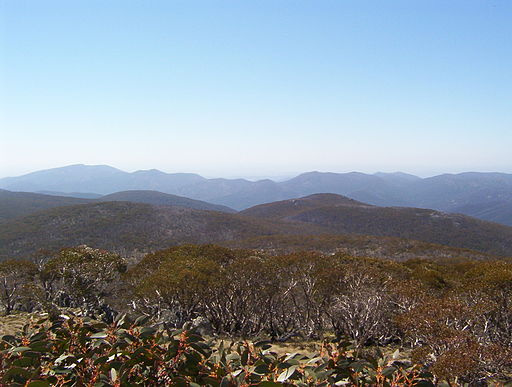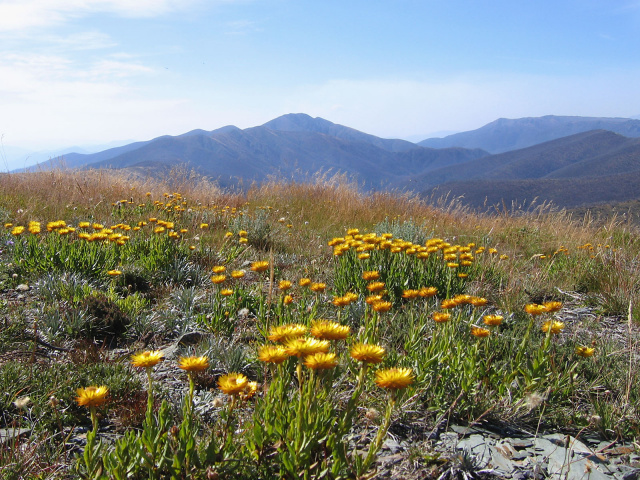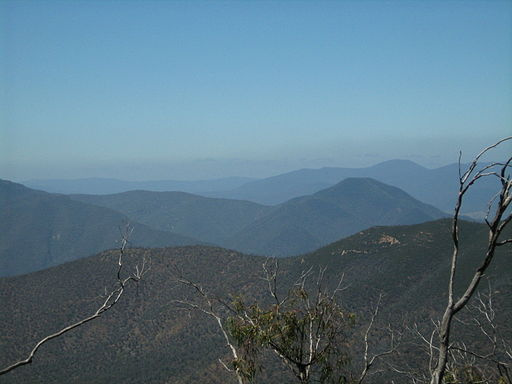Climbing the literary mountain...
I passed the halfway mark in the composition of my new book the other day.
Well, I'm not sure if it's exactly half way. I won't really know that until it's finished in about 12 months time. But I think it's going to be about 400 pages of typescript.
And when I came to the end of Chapter 14 last Friday, and saw it was page 205, I reckoned that was near enough to the top of the literary mountain that all of us have to climb in the writing of any new book.

Namadgi Walk. By SA 2.5. Wikipedia Commons
High enough to see how far I've come in the ascent behind me. High enough to look out across the valleys below to the vista of open country beyond, with the promise of no more labours with words – at least not until the next mountain comes into view.
High enough to discern the slippery parts, fog patches and rockfalls on the path ahead of me during the descent.
Taking a breather...
But at least time to pause a little ... to take a breather ... and to nod in agreement with the ancient Ent, Treebeard, in that masterpiece of literature and the cinema The Lord of the Rings (which I've been watching again lately on the new television in my annual ritual), that he liked heading south through the forest because "it always feels like going downhill."
So, too, does it seem to a mere author feeling his age in a suburban house in Canberra, contemplating the midway point in a journey and the hopefully easier steps to be taken down the slopes before him.
Actually I've taken a bit more than a breather. I've taken a whole week off from the writing and research – in part to work on the publication of my new eBook (of which more in the next few weeks), in part to throw a celebratory lunch with my cousins and some dear friends who've recently returned from overseas.
But mainly I've been using this past week or so to review the progress of the book as a whole, now that I can see it more or less in its entirety from this vantage point at the summit of the creative arc.
... and taking stock
Actually, it's no bad thing to take stock like this, halfway through. You can judge pretty well if the narrative flow is taking you where you wanted it to when you set out on the pilgrimage. You can see if the parts are fitting together as you hoped they would when you first began planning the work.
Any problems of character, voice or structure are much clearer – and are certainly easier to address at this midway point. As are those issues of pace and editorial compression that are constantly in your mind every step of the way.

Mt Hotham, By John O'Neill. Wikipedia Commons.
And while, for the historical novelist, the business of research continues not just to the end of the composition but onwards, cutting through the thickets of revision, redrafting and editing almost to the final goal of publication, at least up here you can see what gaps you've bypassed that need to be filled, and the principal points of reference that will have to be navigated on the road ahead.
Points of reference
In the present work involving a soldier-settler family, the book divided itself fairly easily into three main parts: First World War ... Between the Wars ... Second World War.
I'm conscious that, so far in this middle part, I've been concentrating on their first years in Australia: 1920-21. It was all new and interesting and a time of substantial change for them, and hence the experience imprinted itself on the family's collective memory.
But now that they've pretty much settled in the district that was to be home for the next 40 years, and the routines of daily life are becoming established, I anticipate being able to move fairly quickly through the Twenties and Thirties, dramatising the key events in their story of place and time and family, until the outbreak of War again – and the tragedy that was to engulf them.
I am, after all, writing a novel ... not a history. And I must say that, having spent so much time as an author in the trenches – with this and many of my previous books – the last few months have been a joy for me to write about hope, and peace, and the south-eastern Australian landscape that I love.
Hence the pleasure in this little holiday ... to recharge the energies ... cook lunch for my friends ... spend a bit more time in the garden ... and try to understand the mysteries of eBook formatting. So many people are doing it these days that it can't be TOO hard to understand, even for an early septuagenarian.
Symptoms of guilt
Yet the strange thing is that, after only a few days away from the discipline of writing my daily quota of words, I’m beginning to feel symptoms of guilt. A few days of loosening the harness, and I begin to champ rather and feel anxious about not being back between the shafts.
My loved ones tell me that I'm too highly strung and need to learn to relax a bit more. But I ask you, how can I? I know what the next episode in my story is to be – a dramatic and poignant scene of childbirth and death in the influenza epidemic of the early Twenties.
The research and letters are there ... and so is that mounting sense of urgency and excitement to write it down. To deny it, is to deny a writer’s innermost daemon.
After all, were it not for this compulsion ... the obsession, almost, to put into words the story you have to tell, none of us would set out on the long travail of authorship in the first place. Nor would we find the resolve to stick it out through the years of slog that you know lie ahead when first the idea for the book comes into your mind.

Australian Alps. By Smegs O7. Wikipedia Commons
Belief in the idea
We all need to have a belief in the value of the idea that is strong enough to sustain us, if necessary, through the perils of rejection, self-doubt and criticism we'll probably encounter along the way.
And that being so, as it certainly is with the soldier-settler family, how can I bear to be away from them for any length of time? Always the story is playing itself out just below the surface consciousness ... and the only way to get rid of it is to write it out of my system.
Thus while I stood on the crest this week, full of self-congratulation that I was halfway there, the nagging realisation came that I was, indeed, only half way there. I still had the same distance to travel – and more – before I could say that the journey was done.
So I enjoyed my lunch. Weeded the garden for the coming spring. Went to the annual Children's Book Council of Australia awards. Discovered something new about eBook formatting. And come Monday morning prepared myself to buckle on the harness again and place myself back in the literary traces.
Photo Credits:
Namadgi walk: By Dfrg.msc (Own work) [CC-BY-SA-2.5 (http://creativecommons.org/licenses/by-sa/2.5)], via Wikimedia Commons.
Mount Hotham: By John O'Neill, Wikipedia Commons.
Australian Alps: By Smegs07 at en.wikipedia [Public domain], via Wikimedia Commons.
